11 Jan 2025
Sierra Leone has reported its first confirmed case of mpox since the world's highest alert level for the potentially deadly viral disease was raised last year.
"The patient is a 27-year-old man from the rural district of the Western Zone," near the capital Freetown, the National Public Health Agency stated in a social media post.
"Health teams are actively tracing and investigating to identify potential exposed persons and to prevent further spread," it said.
The agency added tests had confirmed the case on January 10 but did not specify the variant affecting the patient. ...
Sierra Leone has reported its first confirmed case of mpox since the world's highest alert level for the potentially deadly viral disease was raised last year.
"The patient is a 27-year-old man from the rural district of the Western Zone," near the capital Freetown, the National Public Health Agency stated in a social media post.
"Health teams are actively tracing and investigating to identify potential exposed persons and to prevent further spread," it said.
The agency added tests had confirmed the case on January 10 but did not specify the variant affecting the patient. ...







Comment